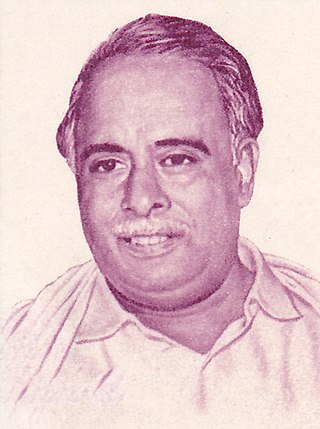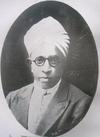Related Research Articles

Chakravarti Rajagopalachari BR, popularly known as Rajaji or C.R., also known as Mootharignar Rajaji, was an Indian statesman, writer, lawyer, and independence activist. Rajagopalachari was the last Governor-General of India, as when India became a republic in 1950 the office was abolished. He was also the only Indian-born Governor-General, as all previous holders of the post were British nationals. He also served as leader of the Indian National Congress, Premier of the Madras Presidency, Governor of West Bengal, Minister for Home Affairs of the Indian Union and Chief Minister of Madras state. Rajagopalachari founded the Swatantra Party and was one of the first recipients of India's highest civilian award, the Bharat Ratna. He vehemently opposed the use of nuclear weapons and was a proponent of world peace and disarmament. During his lifetime, he also acquired the nickname 'Mango of Salem'.

The Dravida Munnetra Kazhagam is an Indian political party based in the state of Tamil Nadu, where it is currently the ruling party, and the union territory of Puducherry, where it is currently the main opposition.
The Justice Party, officially the South Indian Liberal Federation, was a political party in the Madras Presidency of British India. It was established on 20 November 1916 in Victoria Public Hall in Madras by Dr C. Natesa Mudaliar and co-founded by T. M. Nair, P. Theagaraya Chetty and Alamelu Mangai Thayarammal as a result of a series of non-Brahmin conferences and meetings in the presidency. Communal division between Brahmins and non-Brahmins began in the presidency during the late-19th and early-20th century, mainly due to caste prejudices and disproportionate Brahminical representation in government jobs. The Justice Party's foundation marked the culmination of several efforts to establish an organisation to represent the non-Brahmins in Madras and is seen as the start of the Dravidian Movement.

Conjeevaram Natarajan Annadurai, popularly known as Anna, also known as Perarignar Anna, was an Indian politician who served as the fourth and last Chief Minister of Madras State from 1967 until 1969 and first Chief Minister of Tamil Nadu for 20 days before his death. He was the first member of a Dravidian party to hold either post.
The Balija are a Telugu-speaking mercantile community primarily living in the Indian states of Andhra Pradesh, Tamil Nadu, Karnataka and in smaller numbers in Telangana and Kerala. Balijas are known as Banajigas in Karnataka.
The anti-Hindi-imposition agitations in Tamil Nadu have been ongoing intermittently in the southern Indian state of Tamil Nadu since the early 20th century. The agitations involve several mass protests, riots, student and political movements in Tamil Nadu concerning the official status of Hindi in the state.
George Joseph was a lawyer and Indian independence activist. One of the earliest and among the most prominent Syrian Christians from Kerala to join the freedom struggle, George's working life in Madurai and is remembered for his role in the Home Rule agitation and the Vaikom Satyagraha and for his editorship of Motilal Nehru's The Independent and Mahatma Gandhi's Young India.

P. Jeevanandham also called Jeeva, was a social reformer, political leader, litterateur and one of the pioneers of the Communist and socialist movements in the state of Tamil Nadu, India.
Erode Venkatappa Krishnasamy Sampath, usually referred to as E. V. K. Sampath was a prominent politician from Tamil Nadu, India. He was an advocate of the Dravidian Movement of Periyar E. V. Ramasamy and was considered by some as his political heir. He later split from Periyar's Dravidar Kazhagam to form Dravida Munnetra Kazhagam (DMK) along with C. N. Annadurai. In spite of being one of the founders of DMK he later left and formed his own party, by the name, Tamil National Party. Nevertheless, he later merged his party with the Indian National Congress. He is a former Member of Parliament from the constituency of Namakkal.

Erode Venkatappa Ramasamy, revered by his followers as Periyar or Thanthai Periyar, was an Indian social activist and politician who started the Self-Respect Movement and Dravidar Kazhagam. He is known as the 'Father of the Dravidian movement'. He rebelled against Brahmin dominance and gender and caste inequality in Tamil Nadu. Since 2021, the Indian state of Tamil Nadu celebrates his birth anniversary as 'Social Justice Day'.

Periyar E. V. Ramasamy, also known as Ramaswami, EVR, Thanthai Periyar, or Periyar, was a Dravidian social reformer and politician from India, who founded the Self-Respect Movement and Dravidar Kazhagam. In 1919 Periyar Ramaswamy joined the Indian National Congress after quitting his business and resigning from public posts. He was the chairman of Erode Municipality and undertook Constructive Programs spreading the use of Khadi, picketing toddy shops, boycotting shops selling foreign cloth, and eradicating untouchability. In 1921, Periyar was imprisoned for picketing toddy shops in Erode. When his wife as well as his sister joined the agitation, it gained momentum, and the administration was forced to come to a compromise. He was again arrested during the Non-Cooperation movement and the Temperance movement. In 1922, Periyar was elected the President of the Madras Presidency Congress Committee during the Tirupur session where he advocated strongly for reservation in government jobs and education. His attempts were defeated in the Congress party due to a strong presence of discrimination and indifference. He later quit the party on those grounds in 1925.

Tiruvengimalai Sesha Sundara Rajan (1880–1953) was an Indian medical doctor, politician and freedom-fighter who served the Minister of Public Health and Religious Endowments in the Madras Presidency from 1937 to 1939.

Woothampatti Punnaivana Ayya Soundarapandian was a leading figure in Nadar Mahajana Sangam and became the first Nadar member of the Madras Legislative Council upon a recommendation by P.T. Rajan in 1920. Nadar's family had previously supported and worked for the electoral victory of P.T.Rajan. He is known for his effort to associate the Nadar community with the Self-Respect Movement founded by Periyar E. V. Ramasamy. He was known as the uncrowned king of the Nadar community.

The second legislative assembly election for the Madras Presidency after the establishment of a bicameral legislature by the Government of India Act of 1935 was held in 1946. The election was held after 6 years of Governor's rule starting from 1939, when the Indian National Congress government of C. Rajagopalachari resigned protesting Indian involvement in World War II. This was the last election held in the presidency - after Indian independence in 1947, the presidency became the Madras state. The election was held simultaneously with that of the Legislative Council. The Congress swept the polls by winning 163 out of 215 seats. The years after this election saw factionalism in Madras Congress party with divisions across regional and communal lines. Competition among T. Prakasam, C. Rajagopalachari and K. Kamaraj resulted in the election of Prakasam as the Prime Minister initially. But he was later defeated by Omandur Ramaswamy Reddiar with Kamaraj's support. In turn, Reddiar himself was ousted to make way for P. S. Kumaraswamy Raja with the support of Kamaraj.

The third legislative council election to Madras Presidency after the establishment of dyarchical system of government by the Government of India Act, 1919, was held in November 1926. Justice party lost the election to Swaraj Party. However, as the Swaraja Party refused to form the Government, the Governor of Madras set up an independent government under the leadership of P. Subbarayan and with the support of nominated members.

The second legislative council election to Madras Presidency after the establishment of diarchical system of government by the Government of India Act, 1919 was held in 1923. Voter turnout was higher than the previous election. Swarajists, a breakaway group from Indian National Congress participated in the election. The ruling Justice Party had suffered a split, when a splinter group calling themselves anti-Ministerialists left the party. It won the highest number of seats but fell short of a majority. Nevertheless, Madras Governor Willington invited it to form the government. Incumbent Justice Prime Minister Panagal Raja was nominated by party leader Theagaraya Chetty to continue as Prime Minister for a second term. The government survived a no-confidence motion, brought against it on the first day of its tenure by the opposition headed by C. R. Reddy.
The second legislative council election for the Madras Presidency after the establishment of a bicameral legislature by the Government of India Act of 1935 was held in March 1946. The election was held after 6 years of Governor's rule starting from 1939, when the Indian National Congress government of C. Rajagopalachari resigned protesting Indian involvement in World War II. This was the last direct election held for the Madras Legislative Council in the presidency - after Indian independence in 1947, the presidency became the Madras state and direct elections to the council were abolished. The election was held simultaneously with that of the Legislative Assembly. The Congress swept the polls by winning 32 out of 46 seats. The years after this election saw factionalism in Madras Congress party with divisions across regional and communal lines. Competition among T. Prakasam, C. Rajagopalachari and K. Kamaraj resulted in the election of Prakasam as the Prime Minister initially. But he was later defeated by Omandur Ramaswamy Reddiar with Kamaraj's support. In turn, Reddiar himself was ousted to make way for P. S. Kumaraswamy Raja with the support of Kamaraj.

The Anti-Hindi imposition agitation of 1937–40 refers to a series of protests that happened in Madras Province of British India during 1937-40. It was launched in 1937 in opposition to the introduction of compulsory teaching of Hindi in the schools of the province by the Indian National Congress government led by C. Rajagopalachari (Rajaji). This move was immediately opposed by E. V. Ramasamy (Periyar) and the opposition Justice Party. The agitation, which lasted for about 30 months, was multifaceted and involved fasts, conferences, marches, picketing and protests. The government responded with a crackdown resulting in the death of two protesters and the arrest of 1,198 persons including women and children. The mandatory Hindi education was later withdrawn by the British Governor of Madras Lord Erskine in February 1940 after the resignation of the Congress government in 1939.
The Indian independence movement had a long history in the Tamil-speaking districts of the then Madras Presidency going back to the 18th century.
S. Ramanathan was an Indian politician who served as the minister of Madras Presidency in the Congress-led government of 1937. He was the first founder of the Self-Respect Movement.
References
- Dr. P. Varadarajulu Naidu commemoration volume. Birthday Celebration Committee. 1955.